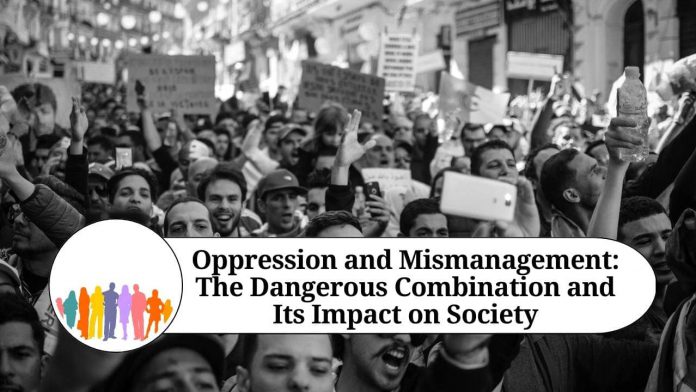Oppression and Mismanagement: A Dangerous Combination
Oppression and mismanagement are two intertwined issues that can have significant negative consequences in any context. Oppression refers to the use of power and control by individuals or groups to subjugate and exploit others, while mismanagement is the failure to effectively govern or organize resources. In this blog post, we will explore the connection between oppression and mismanagement, and the impact they can have on people and society.
- Oppression: Understanding the Root of the Problem
Oppression can take many forms, including systemic discrimination, physical violence, and emotional abuse. It can be fueled by factors such as race, gender, religion, and sexual orientation. The effects of oppression can be devastating, leading to loss of dignity, identity, and basic human rights. In many cases, oppressed individuals are unable to advocate for themselves or fight against the oppressive systems in place.
- Mismanagement: The Consequences of Poor Governance
Mismanagement can arise in any system, from a small organization to a large government. It can lead to a lack of accountability, corruption, and inefficiency. Mismanagement can have serious consequences, including financial losses, harm to public health and safety, and a lack of trust in leadership.
III. The Intersection of Oppression and Mismanagement: A Recipe for Disaster
When oppression and mismanagement intersect, the impact on individuals and society can be catastrophic. Oppressed individuals are often the most vulnerable to the negative effects of mismanagement, as they lack the power and resources to advocate for themselves. Meanwhile, mismanagement can perpetuate and exacerbate systems of oppression, leading to further harm and marginalization.
- Examples of Oppression and Mismanagement in Action
There are many examples of the ways in which oppression and mismanagement intersect in society. For instance, in the context of healthcare, mismanagement can result in inadequate access to resources and discriminatory practices. In the criminal justice system, systemic oppression can be reinforced by the mismanagement of data, resources, and policy. Meanwhile, in the workplace, mismanagement can perpetuate power imbalances and create a toxic culture that enables harassment and discrimination.
Read Other Useful Blogs:
- Moving Forward: Addressing Oppression and Mismanagement
Addressing oppression and mismanagement requires a multifaceted approach. Leaders must acknowledge and take responsibility for their role in perpetuating these systems. Additionally, efforts should be made to provide support and resources for oppressed individuals to advocate for themselves. Finally, promoting transparency and accountability can help to prevent mismanagement and promote a culture of responsibility.
In conclusion
Oppression and mismanagement are two interconnected issues that can have severe consequences for individuals and society. By recognizing the impact of these issues and taking steps to address them, we can work towards creating a more just and equitable world.
Frequently Asked Question
Q: What is oppression?
A: Oppression refers to the use of power and control by individuals or groups to subjugate and exploit others. This can take many forms, including systemic discrimination, physical violence, and emotional abuse.
Q: What is mismanagement?
A: Mismanagement is the failure to effectively govern or organize resources. It can lead to a lack of accountability, corruption, and inefficiency, and can have serious consequences in any system.
Q: How do oppression and mismanagement intersect?
A: When oppression and mismanagement intersect, the impact on individuals and society can be catastrophic. Oppressed individuals are often the most vulnerable to the negative effects of mismanagement, as they lack the power and resources to advocate for themselves. Meanwhile, mismanagement can perpetuate and exacerbate systems of oppression, leading to further harm and marginalization.
Q: What are some examples of oppression and mismanagement in action?
A: Examples of the ways in which oppression and mismanagement intersect in society include inadequate access to resources and discriminatory practices in healthcare, the reinforcement of systemic oppression in the criminal justice system, and toxic workplace cultures that enable harassment and discrimination.
Q: How can oppression and mismanagement be addressed?
A: Addressing oppression and mismanagement requires a multifaceted approach. Leaders must acknowledge and take responsibility for their role in perpetuating these systems, and efforts should be made to provide support and resources for oppressed individuals to advocate for themselves. Promoting transparency and accountability can also help to prevent mismanagement and promote a culture of responsibility.




















